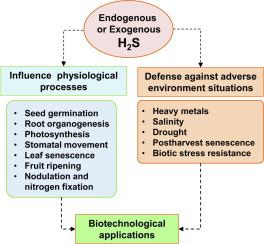当前位置:
X-MOL 学术
›
J. Adv. Res.
›
论文详情
Our official English website, www.x-mol.net, welcomes your
feedback! (Note: you will need to create a separate account there.)
H2S signaling in plants and applications in agriculture.
Journal of Advanced Research ( IF 11.4 ) Pub Date : 2020-03-29 , DOI: 10.1016/j.jare.2020.03.011 Francisco J Corpas 1 , José M Palma 1
Journal of Advanced Research ( IF 11.4 ) Pub Date : 2020-03-29 , DOI: 10.1016/j.jare.2020.03.011 Francisco J Corpas 1 , José M Palma 1
Affiliation

|
The signaling properties of the gasotransmitter molecule hydrogen sulfide (H2S), which is endogenously generated in plant cells, are mainly observed during persulfidation, a protein post-translational modification (PTM) that affects redox-sensitive cysteine residues. There is growing experimental evidence that H2S in higher plants may function as a mechanism of response to environmental stress conditions. In addition, exogenous applications of H2S to plants appear to provide additional protection against stresses, such as salinity, drought, extreme temperatures and heavy metals, mainly through the induction of antioxidant systems, in order to palliate oxidative cellular damage. H2S also appears to be involved in regulating physiological functions, such as seed germination, stomatal movement and fruit ripening, as well as molecules that maintain post-harvest quality and rhizobium-legume symbiosis. These properties of H2S open up new challenges in plant research to better understand its functions as well as new opportunities for biotechnological treatments in agriculture in a changing environment.
中文翻译:

植物中的H2S信号传导及其在农业中的应用。
在植物细胞中内生产生的气体递质分子硫化氢(H2S)的信号传导特性主要在过氧化过程中观察到,过氧化是影响氧化还原敏感的半胱氨酸残基的蛋白质翻译后修饰(PTM)。越来越多的实验证据表明,高等植物中的H2S可能是对环境胁迫条件作出反应的一种机制。另外,外源向植物施加H2S似乎主要通过诱导抗氧化剂系统,提供了针对盐分,干旱,极端温度和重金属等胁迫的额外保护,以减轻氧化性细胞损伤。硫化氢似乎也参与调节生理功能,例如种子发芽,气孔运动和果实成熟,以及保持收获后品质和豆科植物根瘤菌共生的分子。H2S的这些特性在植物研究中提出了新的挑战,以更好地了解其功能以及在不断变化的环境中农业生物技术处理的新机会。
更新日期:2020-04-21
中文翻译:

植物中的H2S信号传导及其在农业中的应用。
在植物细胞中内生产生的气体递质分子硫化氢(H2S)的信号传导特性主要在过氧化过程中观察到,过氧化是影响氧化还原敏感的半胱氨酸残基的蛋白质翻译后修饰(PTM)。越来越多的实验证据表明,高等植物中的H2S可能是对环境胁迫条件作出反应的一种机制。另外,外源向植物施加H2S似乎主要通过诱导抗氧化剂系统,提供了针对盐分,干旱,极端温度和重金属等胁迫的额外保护,以减轻氧化性细胞损伤。硫化氢似乎也参与调节生理功能,例如种子发芽,气孔运动和果实成熟,以及保持收获后品质和豆科植物根瘤菌共生的分子。H2S的这些特性在植物研究中提出了新的挑战,以更好地了解其功能以及在不断变化的环境中农业生物技术处理的新机会。











































 京公网安备 11010802027423号
京公网安备 11010802027423号